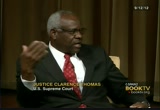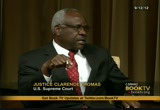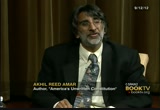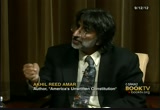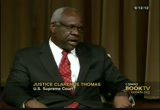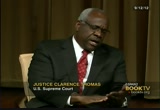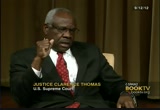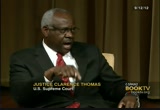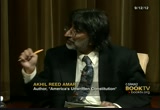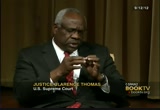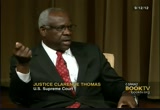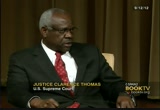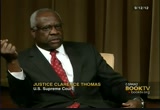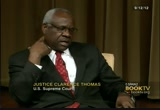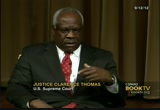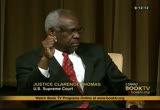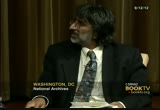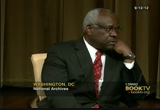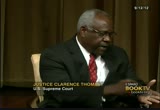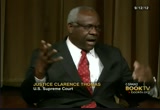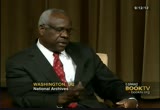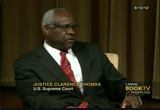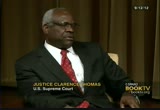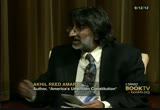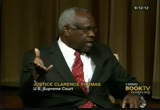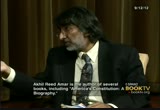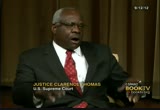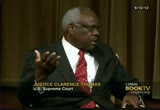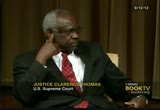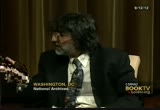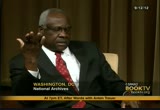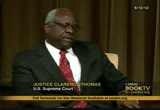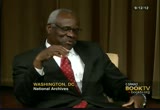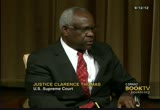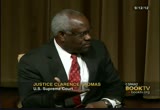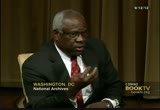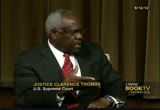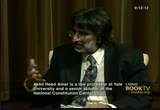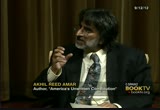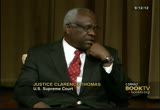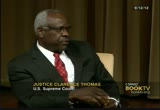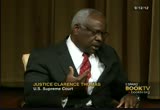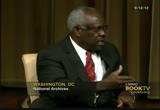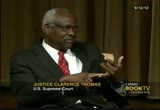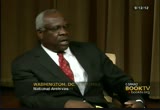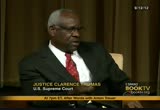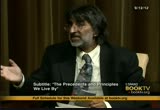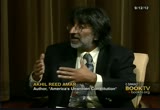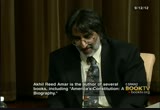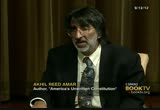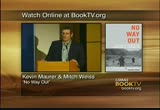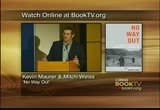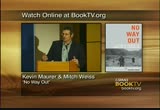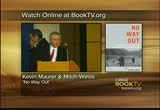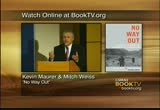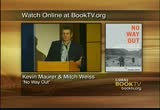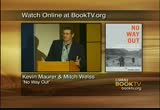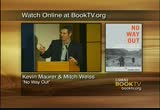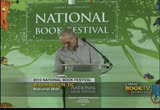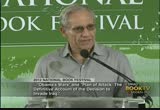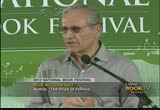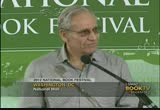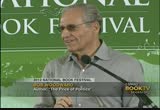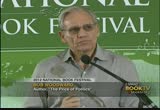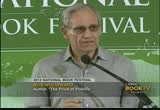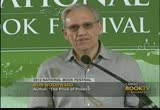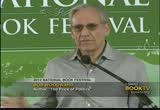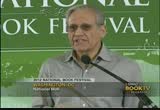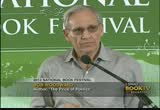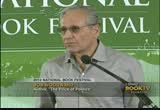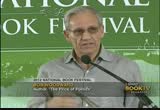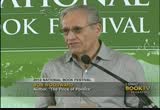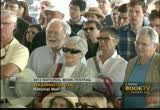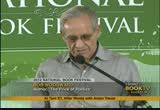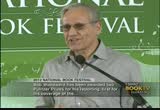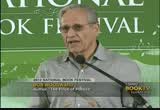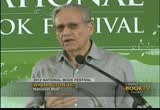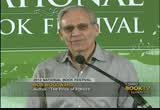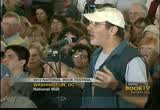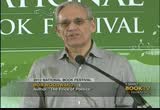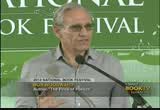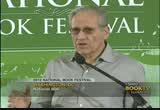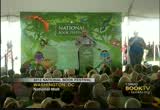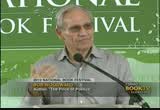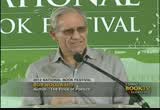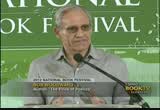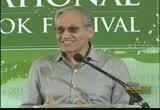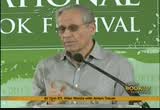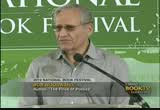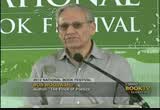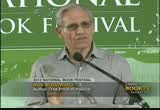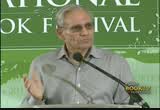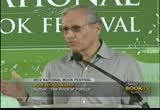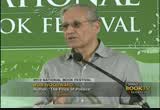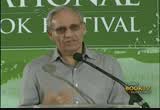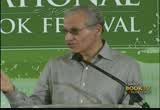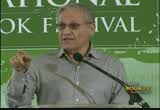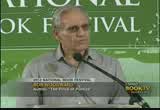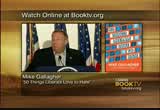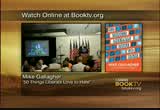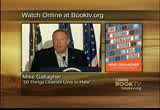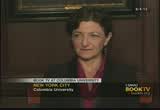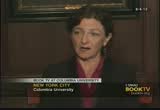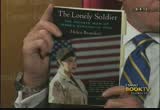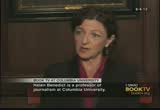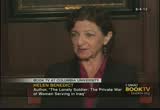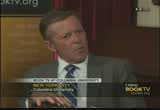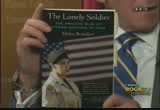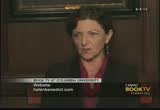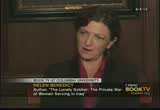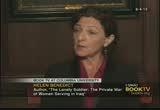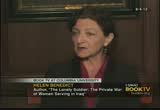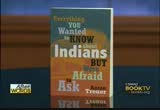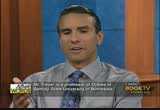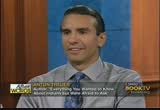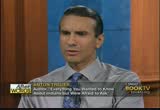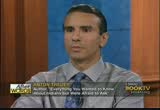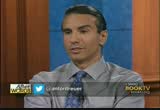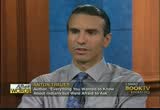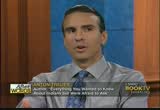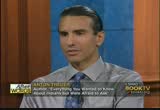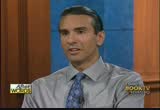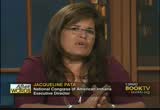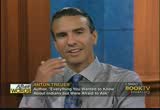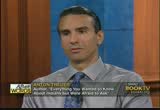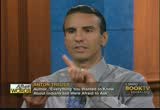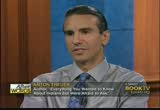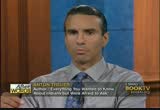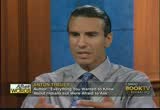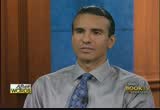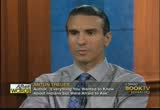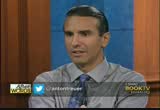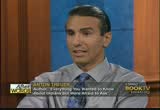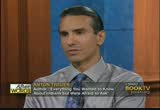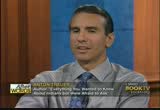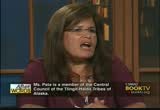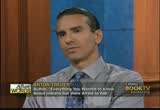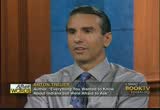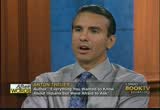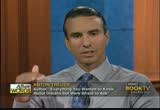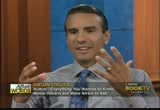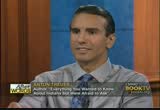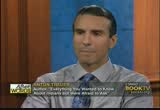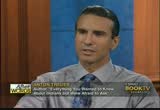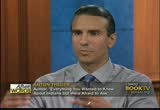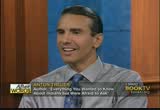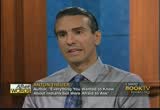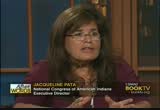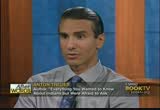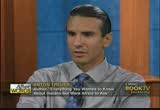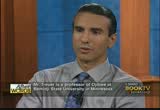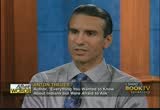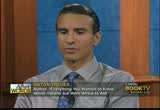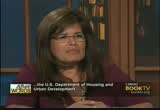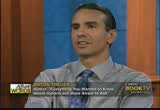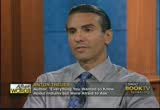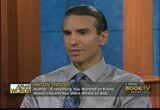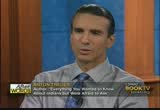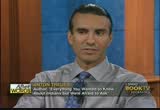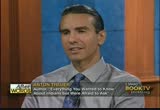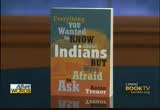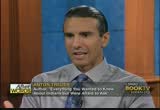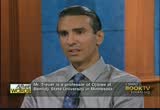tv U.S. Senate CSPAN October 8, 2012 5:00pm-8:00pm EDT
5:00 pm
samuel chase. it's extraordinary how they are kept in the process. >> think about it, if it continues to play out. it's the same thing. what are the limits? what are the limits? i hear people today make it seem as though that when you talk about limits on the national government, that's antithetical to the constitution, the existence of a national government. it's embeddedded in the original argument. it argument was about limits. it wasn't about -- you hear this kind of and all these people trying to push us back to the article. that's ludicrous. and that's -- but helped to develop the constitution. ..
5:01 pm
the same time you understand there are some people still fighting the debate that engage in that debate and subsequent to that even in the adoption of 13th and 14th and 15th amendments you still have so we are still talking about what are the amendments of the national guard? what is the role of the national government, how we protect individual rights and liberties
5:02 pm
etc.. >> what's move forward and start talking about the events that press the 13th, 14th and 15th amendments. i want our audience, everybody on c-span it isn't just -- it is a special anniversary, it isn't just a to enter the 25th anniversary of the year that changes everything in human history, we the people. it's also the 150th anniversary to the month of the first initial emancipation proclamation which is issued immediately after the battle of antietam which is fought september 17, 1862 at 75 years to the day after the
5:03 pm
constitution has gone public if so we marked not just the constitution but the centennial as they call it of the emancipation proclamation, a document you will also find here in this building. i will have more about that to say in a moment. talk about the forebears, the founding fathers some thoughts that show the refunding of the father abraham may be bringing lincoln's into the picture and your thoughts about this new birth of freedom that begins with emancipation you have a story your grandfather and you mention his grandmother was a freed slave so some thoughts about that. >> from the south, a blanket was a great bonanza peter.
5:04 pm
i know there's revisionism today. i have photographs of lincoln. i don't have a problem with clothing everything in the revision. abe lincoln meant quite a bit to us. you begin to see what the country is at the beginning and its threat to veto you've got the south that i began in that instance and the mainland, but
5:06 pm
always a desire to be part of this country and lincoln had the promise of 48 it's a promise of freedom and the 48 so you would hear people talk about the lack of freedom in the same way they would talk about the problem but it directly affected my forebears so it was a jury special place in my heart and keep in my office a copy of the emancipation proclamation because in particular interest and what it has done for those who came before me. we are from eight plantation or part of my family is from a
5:07 pm
plantation south of savannah. my grandfather was raised and that's what we saw just across from the plantation where his grandmother was and his great grandmother in the 1870's right after he was free and he said we are going to be raised in the ways of slavery. that is the way that we were raised on that farm. very hard life, but it is a life of which i am enormously proud. there's not been a moment in my life i have nothing but the greatest pride in the people who grew up in the most difficult circumstances with the dignity that is unmatched in this city and any of the great cities in the country. it's a mobility of humanity simply because of the dignity with which the negatives that
5:08 pm
were put in their way and the harshness of life. my grandmother is still the greatest person. you told me of a person who could have accepted and not have a father or lose a mother handed from pillar to post from the grandmother and build new education and yet segregation, jim crow law rose above it and insisted that his grandson's rise above its. fight, participate, eliminate but do not be consumed by it.
5:09 pm
in so many ways we talk about the founding fathers and yet the house fell in a way because of the contradiction and the generation rebuilds it. frederick others see -- frederick and others. do we today in our law and our culture give enough credit to that refunding? >> you think of the great moments in our history. we talk about of course the revolution, certainly the constitution that we celebrate now, 225 years. it was all coming apart and the
5:10 pm
country as we know today is reshaped after the civil war. the constitutional law what would it look like if there were no 14th amendment to the states. there is so much that goes beyond the war. i tell my clerks we have to go to gettysburg. this isn't just about pulling these little threads out of what we do every day about journalism and original was on and we argue it is much bigger than that. i see some people here who argue before the court. i'm not once thought the people who came here did not understand that what we did is larger than who we are that we would engage
5:11 pm
in enterprise to preserve something that is truly great. dewey agree? no more than the agree, no more than nason and hamilton agreed. but do we say they do not want it to work? no. that's the beauty of the, the people. we agree that we should have a country exactly what this should be. we disagree. not so to the point that we destroy it, but certainly to the point that we think that we are protecting it and we are still here. i meant lincoln saw what was happening with the civil war. he saw that slavery we could not exist half slave and half free. you have to have a union and
5:12 pm
ultimately it couldn't be a slave country that allowed slavery. i know that you have your revisionist and i don't have time to pick the line to out of everything. lincoln preserved the union. frederick douglass you mentioned also has a portrait of him behind my desk. he's been there on the court to decades ago. i am a big fan of frederick douglass. i want you to think of what courage it took for a slave to stand where he stood and cite the declaration of independence, not something that is foreign to this nation, but the founding document of the nation. he cited that as exhibit a. and what was wrong with slavery. exhibit a. you don't need to go to any other shores or ideology.
5:13 pm
was our founding of ideology. how could you be inherently equal and have sleeves and be featured in other ways? he understood that. so, we fought a great war, you go to gettysburg and what does he say? it is up to less, the living to make it all worthwhile. really living to the we have the opportunity to find that amount of time to make it work. you disagree with someone. that person's motives must be bad. that's not the case. i don't think that the motives were bad. you could probably say you know that he is a man that is always upset about doing something, but he contributed.
5:14 pm
washington did not want to go. hamilton was young and you know he wanted to make money. i don't know. but he contributes. and so i think that we should sort of look at this more in the way not fractions like the civil war but rather as people who are engaged in this great project has lincoln left us in gettysburg, and we may be disagree. that is one of the things i like. i've been there now through number of members in the court, and in the years i've been there, i honestly come away thinking that every member really wants to make it work. every single member. they don't agree with each other but somehow they agree this is
5:15 pm
more important than we are and we have to make this thing work. so yes i am on lincoln person and frederick douglass person, i am a booker t. washington person. i grew up loving these people. one last point. i want you to think of a little kid in savannah georgia and the carnegie library and see pictures of him, the great imitator. booker t. washington, frederick douglass, w.e.b. du bois, george washington. you see what i'm saying? you can grow up this is a part of your life, this is a part of your fact, this is the underpinning and what do you think you bring to the court? you bring the sense that it's not some ambition.
5:16 pm
its obligation on something that the started. it's this calling that you have to do what you are supposed to do. is it hard? sometimes. is it is agreeable? sometimes. is it the right thing? all the time. i bet if we can get lincoln to come back and we could ask him how hard the civil war was and how hard being president was whether or not he would say to you if it was worth it but i am willing to bet that if you were to ask washington to come back and asked him whether it was leaving the family to fight at valley forge you say it is worth mount vernon to leave to go to
5:17 pm
the constitutional convention. you would say it is worth it to leave to become president. you would say it is worth it. all of the absentees, all of the day's i think they would say at. i am booker t. washington, frederick douglass, and i keep those around me to remind me what our obligations are. yours and mine. >> the first time i think i heard you you were talking of the declaration of independent which mr. lincoln a alludes to write out of the gate in the gettysburg address. that's 1863 kutz 1776 when you do the math. many quotes from the declaration
5:18 pm
and dedicated to the proposition that all men are created equal that is the language from which the declaration you have thoughts about the declaration and its unfair along side the gettysburg address and the emancipation and the constitution as self to tell us a little bit about how you think about the declaration and it's part of the american story. >> in the beginning we had these rights endowed with certain unalienable rights and we give up some of those rights to be governed by consent. that's critical. for me when i started though it wasn't so much about the government. it's what was the best argument against slavery.
5:19 pm
it was as simple as that. when you grow up under segregation, you take the founding documents and you use it as to make to others who think that segregation is right. we are inherently equals. it is ingrained in us the declaration and our faith in god we were created equal and they don't have to go to the religious document, they went to the founding document that we are created equal. that was always thus least that you carried if you were treated badly when people try to ingrain it in you and it affected your self-esteem, it affected line and they are absolutely no point in my life because from day one
5:20 pm
we knew we were equal. it said so and by golly the declaration of independence and it may have taken a war and jim crow laws but here was this document so it starts there then you look and that is what got me started again. to read this document and talk about the founding. i wasn't going to be a judge. who knows how i became a judge. i was only interested in the best about this country with all of its problems the things that made it with having come and lo and behold, you come to the understanding that this founding document and it's great experiment is a wonderful thing.
5:21 pm
and that was in the 1980's. i was the chairman of the eeoc worrying about budgets and getting in all sorts of trouble over the age discrimination and employment act in this hearing and that hearing and none of which was of great consequence for the structure of the country. but spending hour after hour learned about this, things you write about and teach so eloquently, i think that for me that central document is the greatest and the declaration of independence and to then go to gettysburg and think about the charge, to think about the carnage and the lives lost, the great battles before fredericksburg and chancellorsville you talk about
5:22 pm
antietam and shiloh and the masses. all of these battles for people defending you know what they think of as a way of life for slavery and all of it, all of that blood shed to settle this contradiction, and we won. we have our country, and i like to go to gettysburg to say to the clerk's do we deserve this? do we deserve this sacrifice for the country that we have and are we living up to that? are we doing our part? the people in the battle of the bulge or we think of them as, you know, during any war and just ask yourself what's assume
5:23 pm
without debating whether you should have this battle they've done their part had we done hours and the thing that i was told i was going to be a priest, that is the goal that i had. it is your call to do something and i was looking for that next. suppose your call was to do your part to be able to earn the right to be. in your book on the first page and the last page i mention again the declaration of independence has a very prominent endowed by our creator
5:24 pm
at the very end and the minister very military language and appealing to the supreme judge of the world as brave as he is. you look at the constitution and there are references that are not so prominent. jamie randall has talked about my students wrote an interesting paper about accepting the constitution, but it's not prominent in the preamble or other articles. just this week we heard debates and conversations about got on the claims and whether there were sufficient references, so
5:25 pm
the faults about the role of references in our national discourse in our public culture. >> we don't think it's been prominent in the social part of our nation. you can argue atheism but we know it's there so the first amendment is the congress shall make no law respecting the establishment of religion or the free exercise and stay out of it and leave people alone when it comes to their religion obviously assumes the religion. they believe in god. so i'm not going to revise history to pretend that. i grew up in a religious environment and i am proud of it. i was into the priest.
5:26 pm
i'm proud of that. i would probably enormously angry right now. so i am grateful for my faith and on and on apologetic about it. >> this is pretty remarkable we started talking a little bit about how it has changed over time. we could have also added to the 19th amendment and women becoming a part of this part of the democratic inclusion. [laughter] but most of the amendments have made it more perfect. they got rid of it. >> ausley understand.
5:27 pm
>> it is pretty extraordinary. the constitution frees up every american to be eligible for public office, and there is no religious test and that wasn't the prominent feature of the state constitutions. a lot of them actually had religious tests. >> you have the establishment in religion. so, on a understand that but i simply say that the country moved on. i grew up at a time people were respectful of religion and religious people. on grew up when the church was open all the time and nobody broke and and nobody engaged in sacrilegious conduct. it was in the inner city with my u.s. government surplus book bag and scared of dogs more than anything else. but, you know, i really like
5:28 pm
where i grew up. i can't transpose that or superimpose that or superimpose and but i think our current country is what it is and there are some of us who if not for the faith it wouldn't be here. there was nothing in front to tell me it was okay to keep trying. there was nothing in front of me that explain all of the of wrong and the hurt and that pain and the things that happened. there was nothing they could deal with coming and to make you a better person to force you to be a good person when everything around you says you could be like mean and cynical and react and plunged back. so i know all the smart-alecs, they know better than i do but they were not there.
5:29 pm
they were not in the heat, they didn't walk in those steps and i think god for the environment i was enough people that have strong faith and the house i was then and the schools i went to did we impose it on anyone else? no, it was ours, and certainly in my own daily life i respect other people. i don't abuse them or do things to them. you respect them and that all comes from the way that i was raised and that includes the strong thing. >> and this fall to that i had about -- i think that we as americans are pretty respectful of the culture. we begin by saying the system is open to people of different faiths and we are not going to require a believe in the trinity
5:30 pm
so this strikes me at this moment we can look back to under 25 years later that the process that has developed and theirs was a project most americans at the founding or mainstream protestants and today it sort of remains a huge part of our cue and here is what is interesting. none of the justices are mainstream protestants. >> neither jongh boehner or harry reid of the presidential candidates -- and barack obama whose -- what i'm saying is it is an extraordinary openness.
5:31 pm
>> we talk about it a lot. you know, i liked it when i was a kid. we didn't talk about a whole lot. we talk a lot about that person is that and this person is this and we pretend that we are tolerant. i like it when people didn't care. i was catholic. you talk about a minority i was a black catholic in savannah georgia that is an insular -- i was the only black kid in my seminary, 1965, 64 there was another young man. he left and the next two years i was here by myself in savannah.
5:32 pm
they identify a lot more. i kind of like the idea that when it started you and i are here. neither one of us is caucasian and nobody seems to care. you look like your indian descent to the to -- i'm just a little doubtful i should say. but here we are. i think what you should be more concerned about this none of that seems to be more relevant than the face people are but even with that, even if we can nitpick all of that, these are good people. these are people who like a back to what i said. they are what do the continuing
5:33 pm
what happened years ago about the great document. to justice ginsberg how often do we agree? >> a lot actually. >> we do? [laughter] >> many cases are unanimous. i agree on the unanimous case. [laughter] i like that. there's one category that the unanimous case she is a good person and she's a fabulous judge. you know, we are friends but i think that is what we want. we want people who still believe and work together and try to get
5:34 pm
it right but don't change their wind just because they are there just because it is the fad. you want them to think the same way you had it at the convention and we the people, the ratification debate. i'm going to spend time going back to read them simply because that was the time you talk about people like julie saying what they believe. people were actually fighting about, people were actually caring about that, writing articles about. federalist papers, people travelling, having meetings at home and their churches. they can't do that i guess that having people meeting in town halls all over the country debating this. people actually -- this is the fascinating part. people were actually read the constitution. that's something that's new.
5:35 pm
people complain about it today that they actually read it back then. and they were not as universally available. there was no internet to read. but they somehow printed that and talked about that. i think yes it was a debate about this country and its formation and one direction and protections and does it continues its the same debate. you can talk about equal protection and due process, the first amendment. it's all the same debate and it is an appropriate debate and one that i would wish what sort of try to reach the same high level
5:36 pm
that we saw in philadelphia and the other points in the ratification process. who writes like the sort of defenses and arguments that you see in the federalist today. who sits at home and giraffes the arguments that you see and letters? you have a staff drafting this. these are people that were engaged and they also want you to know these were not scholars, these were not people that had appropriated to themselves license to interpret where dhaka this great document. these were foreigners and business people, some of them who had formal education and some who did not, that they cared about this country. again when i go back to your
5:37 pm
book you talk about the written and the unwritten constitution. the unwritten constitution is really what we did. sort of trying to apply at in the evens and problems and cases and that debate continues on each one of those and that's why you see the different points. that's why your scholarship is so important, and one thing i like about the tone of your book is it is so positive it's refreshing. it's not all i have all the answers but do have some answers. let's talk about it. it is sent up here. you've got to explain this, take your parents, they are immigrants. i don't think they are doctors. it's their constitution, too and
5:38 pm
we should explain that and interpret it in a way to make it accessible to them and that is what i think you are trying to do with your book is to make it accessible to open it up. >> here is the one concluding no to discuss the sixth note. the ark of the ever greater inclusion and talk as much as we might have on the women's suffrage but that is of course huge, revolutionary. these amendments that provision aside generally tend to expand liberty and equality which is pretty striking that in general the amendments do that and they don't take us back. now, here is a thought experiment because understanding the unwritten constitution might
5:39 pm
be the constitution still to be written. we are not duncan history isn't over. what amendments are imaginable over the next two and injured 25 years if we look back. >> you and i spent our time thinking 150 years ago, 75 years ago, if we turn the camera around and try to think for word 75 years from now, 150 years, 225 years from now any thoughts at all they are not going to come up before the court immediately, but fought on the democratic project in america or the world bring forward.
5:40 pm
>> i'm not that created for pressing. i do think -- i wonder when people look back as we are looking back now when they say that we added something when we are just trying to score points i would hope that we can say that we made it possible for the contribution as positive and you and i think of the -- those were at the convention and participated in the debate and added something. you know, when we do opinions, i don't like to get into this back-and-forth with my colleagues and quibble with them.
5:41 pm
i like to be at the end of it to say this is what i think we should be looking at or the approach that we should be taking. and that doesn't mean that everybody should agree with me or they should change their mind. i just think that what you are trying to do is think it through and tell them exactly what you think without rancor or personal attacks. but just to try to add something. so i think that we are obligated, you and me to read as we talk about this great document we are obligated to try to improve. we are obligated to disagree but in a way that is constructive and in a way that adds something and is worthy of the constitution we think it is a document up here, and you have kids, you teach them to talk about things in a certain way and to each other in a certain
5:42 pm
way to their parents in a certain way come to your parents and in a respectful way this is a great document. i have lived and the flaw and the contradiction and in spite of that it is you and i, the living. you and i, we are talking about it. i have a job i started this month to go back to that job that we are called to do. you and i have an obligation to do it that adds something and what i don't want is someone to say you know, he was there but it was cynical or negative and didn't think it through. but i wouldn't want them to say i couldn't care less.
5:43 pm
that's not my point. the point is to rethink it through and communicate in a way that adds to this development that we are talking about. think about harlem and plessey. >> the great dissenter and ferguson. >> dewey quote from the majority opinion for the descent the dissent that one today? 60 years later so you write it. he was a lone dissent. >> as understand if my recollection serves me on the court from kentucky which is kind of interesting but these are tidbits sometimes my wife says i get caught up in these things because we read these cases over and over and over and
5:44 pm
just the eloquence. this document knows no cash. >> he didn't quite see that. he says he knows no competition. and i truly believe that he added something. and that's that time, he was alone. people thought that they could deal with us in a constitutional way based on our skin color. that is a contradiction. what do we think we all want to the opinion of those words from justice harlem. it is my understanding that that dissent was what justice thurgood marshall felt when he was despondent and thought that
5:45 pm
he was having great difficulties doing the right thing across this country. he agreed but we both read that. he agreed man and me a little kid and the kid merely trying to get out of that. >> and >> i think that he occupied, but i spent time with him and i would like to just say a word to do a lot of talking on behalf of other people. i sat with him in the meeting when i first got to the court, a courtesy visit that was supposed to last ten minutes and lasted for two and a half hours. i said to him i wish if i had the courage in the age i could
5:46 pm
travel i doubt i would have had the courage that he had to do that, and he looked at me very quietly and said i have to do in my time what i have to do and you do what you have to do. that was all the guidance to talk about this great document that sums sums up those at the convention they have to do in their time and they did it and we have to do in our time what we have to do. >> so, let me add one additional fought and bring our proceedings to a close. this conversation has been in the spirit that you are calling for an hour sponsoring institutions, the federalist
5:47 pm
society and the constitution accountability senator. i think they both do agree on the idea of a serious conversation on this document. since i mentioned amendments i don't make too many predictions but i would say that most of the amendments as a practical matter have to have the support of both parties without both part as being on board, the great amendment of the 1960's for example, the great laconic statutes for the act of '64 and the voting rights of 65 and the spirit that you are calling for we are talking about our sponsoring institutions for this
5:48 pm
really extraordinary conversation, and that's the national archives. i think that the framers of the constitution amended the regime's standing where they have gone before the study the state constitution and they saw which ones work and which didn't. massachusetts but this conversation to a vote so let's put our constitution to a vote. much of the constitution has three branches of government. most of them have bicameral was some and in new york it's built on that and so on and the abolition of slavery and the bill of rights, george mason you mentioned, she first gives virginia's bill of rights and that is a model for the federal bill of rights. abolition of slavery occurred in the various states and then at the federal level. so, we have to start to the custody what has gone before us. we have this duty to the future i think we discharge its best
5:49 pm
when your understanding of respectful and that is part of this national archives is about and if i could tell you the story of why i'm here and justice thomas's presence needs no explanation. he is justice thomas but what am i doing here? when i was 11-years-old i can to the national archives and i got the store and a that is a bigger version of the innovation proclamation, and it was an edition of the ants fusion proclamation. you can take a look on the 100th anniversary in some timber, 1962 and the archives released that special edition for kids like me and i got my picture of abraham
5:50 pm
lincoln. [laughter] >> and coming at a very young age to a place like this being exposed to mr. lincoln and what he did for the human being exposed to the declaration of independence to the constitution but i think and here today honestly because of that to get special thanks for the national treasure, the national archives and i want to thank you all of you for coming to this extraordinary conversation. i want to encourage those on the television audience to come to this place bring your grandkids and your grandnephew covering the next generation here and if you can't come here physically, experience the national archives
5:51 pm
on line, you mentioned the internet yet because it is up to us we can't just think about the future without thinking very deeply about the past. this is a place that will help us do that thinking. and so, i ask all of you to join me in thanking justice thomas and the archives. [applause] in the northeast part of afghanistan cannot be more remote. this valley is a cul-de-sac that goes nowhere, and it's often
5:52 pm
hear the himalaya. getting there is hard and flying helicopters is hard the only way in his life or helicopter was tough and what they were going to do is go after the high-value target and he was a commander in the terrorist group essentially that had some association with al qaeda and some sort of truce with the tell them, but they are nasty characters from chechnya and that are not really there to fight against their version of afghanistan. they are mercenaries and what they're doing in the area is recruiting while pressing people into fighting and he was rumored to have service air missiles and he was also credited with the ambitions and the valley that
5:53 pm
caught the attention of some of the commanders, so they decided they had to go up the network because he was able to export a lot of violence from the safe haven so the idea is to get him and taken to the safe haven. but what they ran into is not only are they fighting the geography because i was such a hard place to get to the also fighting the restrictions known in afghanistan. and i am sure we have all seen the news in the night raids highly regulated. who controls the battles based and it takes a long time to get the mission planned and how to get there and what this could do and where they would be allowed to go and essentially what they came back with this they are going to land in the valley and
5:54 pm
then fly off. the team initially wanted to fly to the top of the valley to the top of the village and then that broke down and helicopter would fly off. but because of the restrictions and because of with the pilots were comfortable doing, the end of having some settle for this mission to unload their troops, which anyone who knows any kind of basic to fight until is never, never a good idea. to never want to do it. it's infantry 101 if you can take the high ground, you want it. but what their commanders had to reconcile with is where they are going to place the risk. is it easier to fly them to the top of the village or put them in the ground before they were there? that is where they were left on the morning of the mission and they know they have to do this mission. it's the spring in the mountains
5:55 pm
of afghanistan. and we have this sinking feeling and that feeling is one of the things that propelled this book and propelled us because we know it is very rare to get soldiers. not only do we have this but we took up the chain and we don't want to do this mission and that sort of starts the book and also starts them on this path that ultimately gets them in the ambush. that is pretty critical what he just mentioned in the look to book. you don't usually get soldiers in the plan and there was a captain who basically just like the other members knew there were flaws in the plan so he
5:56 pm
took his concerns and it is important to do this mission. he helped finance his men in this operation and in fact when they later found out in the cia they had shown up in arizona to finance this whole campaign, and again, going back tactically this plan was flawed but even though they knew it was flawed and that there was incredible danger landing in a helicopter at the valley to the top of the mountain to get to this compound
5:57 pm
by selling it, some of the best mercenaries for that ten years or during the 1980's they still went to carry out this mission and you can describe what's been landed. >> on the border when they fly into this valley there's some concern at this point about the weather. there is a certain window that they had they could get in and out before the cloud cover can answer the have to work quickly as well. but if you can imagine landing in a helicopter and a there was so much rubble and ice and the ground was on the evin and some of them couldn't land, so they
5:58 pm
were jumping out of the back of the helicopters and landing on the rubble river running right in the middle of the landing zone. they get past that with no major injuries. i mean, 10 feet is the size of a basketball court jumping out of that into a boulder and they look up and the mountains surrounding the valley are a lot higher than they ever imagined. they were only looking at the satellite images and i can only -- looking at the buildings and just being surrounded by all sides by just sheer cliffs and they consolidate and start walking towards this village and when we say dillinger ensure that in your head you think i don't know what you see in your head for an afghan village but depending on where you are in the country this village is
5:59 pm
literally cut into the walls almost and stone houses these were like castles stacked on top of each other the with line all the way up and around them and they were surrounded almost -- knott 360 but almost 260 with these stone houses and as they are walking up it takes them a little while to find the path, but they get to the base of the hill and the past pretty much cuts back-and-forth up the hill and switch back as they head up and there is only one way up. you know that you are in the cul-de-sac of of valley now and they know that you are there because they heard the helicopters. if they hear helicopters in this valley it's not them, it's their bad guys, right it's quiet as they are walking up and all of a
6:00 pm
sudden they see three guys running on the top of the valley and one of them got a gun from the 12th annual national book festival on the national mall in washington, d.c., bob woodwardln presents his book price of politics. this is about 45 minutes.alk too ..ave lots of times the questions. and i want to begin by recounting something that occurred about five or six years ago my wife and i were at an
6:01 pm
aging conference and how to deal with aging. how many people are interested in the subject of aging? raise your hand. okay, you all are. i tell you. at age 69, i am deeply interested in the subject of aging. and they have psychiatrists and physicians and so forth on this panel. james watson, who was the codiscoverer of dna, the nobel prize winner was also on the panel. we had the discussion and it went on for an hour, and watson said nothing. that is the end of zero comments. now, you know the power of silence was just overwhelming, and so finally, the moderator, charlie rose asked him, doctor watson, you have done so much work, how do you deal with
6:02 pm
aging. and so he leaned into the microphone and he said there is only one way to deal with aging. and that is to stay away from old people. [laughter] he nailed it. my wife and i were sitting behind doctor henry kissinger, who was in the audience. they handed out his little sheets where you did self scoring. self scoring on your lifestyle. how often do you eat red meat, how many bowel movements you have a weak. [laughter] general health questions. then you have points or you lost points and you added it up, and it told you how many years you had to live. now, how many people here want to know how many years you have
6:03 pm
to live? the skeptical as him as that might rightly be about the scoring sheet, it's very interesting. kissinger was filling this out with all the intensity hunched over and so elsa and i availed ourselves of the reporter's freedom of information act. [laughter] and we looked over his shoulder. we wanted to see how many years he had to live. he added it all up, and it turned out that he died four years ago. [laughter] not happy. i have seen kissinger really unhappy because of things we have written. but this was the depth of unhappiness. and so he looked around, and this was done in pencil. he erased all the answers.
6:04 pm
he rescored. the last time he ate red meat was in 1949. how often do you exercise a week, seven, eight, nine, 10 times a week. and it turned out that he had eight years to live. what is the lesson here? kissinger is the master of this, read his books, he resource history like no one else. but it is the basic problem in journalism and trying to understand politics and what is going on in the world. i was telling this story the other night about al gore, having dinner with him, sitting next to him, not having dinner, sitting next to al gore is
6:05 pm
taxing. it is really unpleasant. we asked him what was going on in the white house and he said 1%. i believe it is higher. but if we step back, we often don't know what is going on. that is the dilemma. i want to talk briefly and then answer questions about her new book that i have done, which is just out, called the price of politics. it is about 3.5 years of negotiations between the obama white house and the republicans in congress and the democrats. how they essentially tried to bring the federal government's financial house to some kind of order. the answer is they failed. we have a federal government whose financial house is in
6:06 pm
total disorder, total disarray. it is a historic problem. to try to put it in english, we have a trillion dollars of iou outstanding in the world. the negotiations, they agreed to raise what they call the debt ceiling, so the government can borrow a couple more trillion dollars. we are going to run it run out of that borrowing authority january or february of next year. they're going to have to go back and authorized congress for more trillions of dollars of borrowing. the republicans and lots of people in congress don't want to authorize that. so there is going to be a bloody negotiation, unless they can work a deal.
6:07 pm
in a sense, this is a book about the past, but it's about the present. it is about where we are going and what the country's future is. if you think about it i would argue that the inability of the government to fix this borrowing debt deficit issue in the book, vice president biden's chief of staff, talking about the economic crisis in 2011, that's exactly what is going on. there is so much evidence that it is the biggest future. we are on the path becoming europe and greece. you just can't keep borrowing
6:08 pm
money. there is a stunning and fiction in this country, and we need some sort of we need some serious intervention. in the book, what i attempt to do is take people to the presidents and leaders and tell you exactly because of the luxury of time and my publisher, simon & schuster, i declined to get the meeting notes to get the exact detail to interview president obama and speaker boehner and the key players in this. i just want to take one quick snapshot from what happened that we didn't know about, which is
6:09 pm
critical. when the cops pull up less when the president was upset, he called the congressional leaders on a saturday morning at 11:00 o'clock a.m. something in democratic andemoat republican leader were trying to work outth the own deal harry reid, the democratic leader, said to the president, mr. president, could you please leave the room? i have covered presidents for four years. i know of no other time where the president was asked the meeting in his own house that he had called. i asked the president about this. i said how did it feel to be voted off the island in your own house. because that is what happened. he said that he was not going to stand on protocol, that the
6:10 pm
problem needed to be solved. but in the next day, he called democratic leaders to the white house from 6:00 o'clock on a sunday night. and harry reid is there, the house leader, the relations between and among the democrats are so not solved, that harry reid, is a chief of staff, makes a presentation on the deal if reid is trying to work out with the republicans. in the course of doing that, david corn says to the president of the united states, in the oval office is in his house, i am disappointed in this white house and you for not having a fallback plan. literally, again. somebody reading of the president in the oval office for
6:11 pm
not having a plan. after the meeting, harry reid said to his chief of staff, stood up to him, he needed to hear it. no one was telling him. think about it for a moment. what is the second most powerful democrat in washington have to use his chief of staff as a lever to send a message to the president of the united states? i was talking to somebody from amazon.com the other day. as you may know, they take books and they divide them as red states and blue states. most of the books selling in red states, republican state, blue state, democratic states, and i have said, where does this football? where is it to and he said well, it's purple. because it has information about
6:12 pm
both sides in all of us. it shows that there is a war going on, not just in the democratic party, but the republican perhaps much more intense. john boehner is trying to work a deal with the president to do tax reform and entitlement reform and his deputy, the majority leader, calls people like paul ryan, who is now running for vice president. ..
6:13 pm
>> if you keep doing this, you are going to risk your speakership. the president said when i talked to him, interestingly enough, he said in fixing -- he realizes the magnitude of all of this, as does speaker boehner, key democrats, key republicans realize what it is. and the president literally said to me, i would willingly lose an election if i could solve these problems. it is that serious. tim geithner, the treasury secretary, in the book is quoted thousands of words telling the president, you have got to do something about this problem. we have to fix it. you literally, it's not that we're going to close down the government, we will close down the american economy and, in turn, the global economy. if they do not solve the issue
6:14 pm
of this runaway spending, get some way to stop borrowing in excess, he tells the president of the united states if we default on this, on our obligations and our ious, we will trigger a depression worse than the 1930s. anybody here remember the 19 1930s depression? you probably don't. i don't. i was not born, but i've read about it. it was a calamity for the world. tim geithner said to the president what, if we default on this, if we do not solve this problem, we will have an economic catastrophe that will make the 2008 financial crisis a footnote in the history books.
6:15 pm
anyone remember the 2008 financial crisis? that's coming not from some columnist or journalist, that is coming from well-informed secretary of the treasury. you think about this, there is a value in running scared. if you think about after 9/11, the terrorist attacks, one thing the country did collectively is they set up tsa, the screening at airports. there are all kinds of work, very significant work done to make sure terrorists did not get into this country. it's been successful to date. it is one of an amazing achievement. if you think about september 12,
6:16 pm
2001, the day after 9/11, it was almost a certainty there were going to be terrorist attacks in this country. there are not been. hundreds of billions of dollars have been thrown at it, all kinds of intelligence efforts, screening efforts, thinking efforts, some of them perhaps extreme, but it worked. this was a time when the government and it leaders in both parties ran scared. they are not running scared on this issue. and if you look at it, it is the thing we know about that is going to do us in. and we've got to fix it. and go for a moment to the presidential campaign going on before us. what are they talking about? not this. not the ting that's most evident -- not the thing that's most evident. why are they not talking about it? part of it i would say it's the
6:17 pm
responsibility of the people in my business, the media. the candidates are not being asked about it enough. it's also complicated. um, it's also something the candidates if you look at what they have said on this issue, both obama and romney's plans are vague. if i were moderating the debate that is coming october 3rd, i would spend about half of it asking them what would you do specifically. give us the diagnosis of the plan -- [applause] and tell us what you're really going to do. and part of that question is there has to be a willingness to compromise, and there has to be an innate willingness to do things that are painful for your side. i'm going to stop there, and we'll do questions. one more story. remember years ago the head of
6:18 pm
simon & schuster after i had published one of my books took me to dinner in new york city at one of these restaurants where you would never want to go where you have to pay. [laughter] and he said what's your next book going to be about in and i said, oh, well, i haven't decided. i'm going to do some thinking, some reading, some research. and he looked at me and said, what? i said, yeah, i want to do thinking, reading, reporting, weighing the alternatives, and he said why are you going to waste your time? [laughter] i said, well, that's what you try to do. and he said, no, no, no, you are one of our authors. i need to know right now, tonight, what your next book is going to be. i said this is, that's preposterous. he said, i need to know. now, he's one of these people who grinds on you, and you're at dipper alone no matter what would come up, he would bring the subject back to, oh, maybe
6:19 pm
you should do a book on that, what about this? he would just grind away. you may know people like this. [laughter] you may work for somebody like that. [laughter] even better, you may be married to somebody like that. [laughter] who just grinds away. so he wouldn't let up. so finally at the end i said to him, i figured out what my next book is going to be. he said, oh, that's great. he said, what? i said, my next book will be an expose of the publishing business in new york city. [laughter] and instead of showing disappointment, he said that's a terrific idea. i have a great title for you. i said, i don't think there are any great titles left. he said, there's one. i said, what? he said, your book, an expose on the publishing business in new york city would be called "my last book." [laughter] and he meant it. [laughter] [applause]
6:20 pm
okay. questions. open microphone. go ahead, sir. >> yeah, hi, bob. i want to ask you something that's alluding to the off-the-line comment you said on al gore. you know that you've been studying the white house 40 years, and you know people all have their own perspective, they all want to be saying things. and if you're the president, you have to listen to all these people. over your 40 years, how did the presidents react, and which ones really did a good job listening and making decisions? >> yeah, that's a great question. i mean, in journalism the great art, and it's hard, is to really listen. and the key to getting people to talk is to take them as serious a. [applause] atake themselves. -- seriously as they take themselves. that's one comment feature. president, most people in government, they take themselves seriously. you find increasingly with all
6:21 pm
the presidents i've tried to understand that the more time they get in office, the more they like to talk and the less they like to listen. and that's a problem. and i was reading the george cannon biography, one of the great books. he's the diplomat who really established the containment policy. and at one point cannon writes in his diary when they've made him ambassador to yugoslavia, he says there is a treacherous curtain of deference that falls on you as the boss. happens to everyone. but it happens ten times to presidents, that treacherous curtain of deference. and everyone is, oh, mr. president, mr. president. and what a president, like any leader needs, is somebody who will tell him the truth.
6:22 pm
>> this upcoming election and before the inauguration has been described as a period of time that's going to be the lame duck session of all lame ducks. and i wanted to ask you the same question that you would ask the candidates which would be something like we're about, we're approaching a fiscal cliff, and this is all going to the happen shortly after or just prior to the inauguration or some time in january. what, what is the, what do you see or what do you predict or what needs to be done to avoid this fiscal cliff? >> okay. happily, i don't have to decide. [laughter] and i don't know. but, i mean, the fiscal cliff is a euphemism. i mean, it's financial. it's the basic financial soundness of the government which connects, believe me, to the value of everything you
6:23 pm
have, a house, a bank account, an investment and so forth. and it is all in jeopardy. it should be called the financial time bomb. and it's tax increases, it's spending cuts, but it's also what i spent a lot of time in the price of politics writing about where you have to extend the debt ceiling. they, the white house, whoever is there, is going to have to go to the congress and say, gee, you know what? we're borrowing a trillion dollars. i mean, think about, i was trying to figure somebody was asking, well, how much is a trillion dollars? that's about $3,000 for everyone in the united states. that's a lot of money. they have to borrow that next year just to pay for what's going on. and how they're going to do that, how they arrange it, i don't know. it's going to be, you know, i may have my second book. go ahead.
6:24 pm
>> hi. in your interviews and in your research, i was wondering how much you came across discussions among the leadership about dealing with the serious problem of jobs in this country. because we're in a second major depression many say since the great -- and it's sort of contrary or contradictory to be concerned about the budget deficit where you'd be taking steps that have a negative effect on the economy, so how much did that take effect -- >> excellent question. and, of course, you create jobs by growing the economy, and you have to not only grow the economy, you need to stable i'd it -- stabilize it. you can't have the situation we're in where the interest rates are right in the basement. and as someone says, you can't jump out of the basement. that's as low as it is. and if people stop trusting u.s. treasuries, the $16 trillion of debt we have out there, interest
6:25 pm
rates are going to skyrocket, interest payments will go up annually potentially by hundreds of billions of dollars, then we would have more deficit, there would be less trust. and so you haven't -- you've wrecked the government's role in the economy. those are my secret notes, i'm going to ping -- pick them up. [laughter] so you have to stabilize that. and you have to figure out a way to get the economy to grow. and that's a long-term proposition which will lead to more jobs. but you're right, there's some contradictions in all of this. but in trying to create more jobs, you can't mess up with the overall problem of the trustworthiness and creditworthiness. you're shaking your head. we'll talk afterwards. next. >> hi. over the course of your career, you've had the most incredible
6:26 pm
access to all these, um, great politicians in history and even today, and i was just wondering out of everyone you've met, who surprised you the most? who is like the least like how they are perceived in history and in the current media? >> oh, wow. that's like asking the question about the creation of the universe. [laughter] they're all interesting, they all have their -- i mean, i just get fascinated with the story of government and what really works and, quite frankly, what we don't know. what is hidden. i remember for a book i did called "the agenda" on bill clinton, and it was about his economic plan. i interviewed him once, and it was on background. but he's talked about it, so i have talked about it. and you go into to the oval
6:27 pm
office. this was early 1994, and clinton drills you with this eye contact that is absolutely a gravitational force. i've never seen anyone maintain eye contact like bill clinton. and to a -- and it's unblinking. and he just stares and, of course, it creates a sense of intimacy, it slows time down, and i remember thinking this eye contact is amazing, and somebody later suggested to me, said, well, he wanted to be president ever since he was 5. [laughter] and he decided to contribute all organs in the body to the task. [laughter] including the eyes. [laughter] and it's, you can drain yourself. you just don't -- you can train yourself, you just don't blink. so we're going through there, and i thought, oh, this is a
6:28 pm
great interview. and he's so focused. i each started thinking, oh -- i each started thinking, oh, he realizes how brilliant my questions are. [laughter] which they weren't. and i thought, left this if and thought, oh, there's this amazing interview. of and i went back and had somebody transcribe it, and i read the transcript without the eye contact, and it was mush. [laughter] he didn't say anything new, didn't say anything that was particularly useful. i think i used one sentence in the whole book from the interview. but, and here's the essence of the clinton communication style, it felt good. [laughter] it felt wonderful. [laughter] and if you look at the reagan tapes, when he was president,
6:29 pm
everyone called him the great communicator. he's a nothing compared to clinton. clinton, i remember interviewing -- there were, there was one meeting where about six or seven people were in the meeting with clinton, and i asked them each what happened, and there was this one woman who didn't say anything. and i said what'd you think of the meeting? and she said i know he agrees with me. [laughter] wow. i mean, that -- i mean, if you can go -- anyway. end of point. >> my question is a little bit simple. it seems to me that where we're at right now is almost at the end of the current monetary system. so my question is, how much talk has there been in your circles about ending the current monetary system, stopping the issuing of money at debt and perhaps going to a united states note instead of federal reserves note? >> well, that's a neck call economic issue. -- technical
6:30 pm
economic issue. you can't bail out on the $16 trillion in ious we have. you just can't. it would be the disaster and the calamity. i don't think, i don't think you can do this with a magic wand. i don't think -- i think the, if you go back to the 1980s, what reagan and tip o'neill did to save social security, they worked a deal where payroll tax went up, the most regressive tax in the history of this country, and they agreed to cut back on some benefits. and part of the deal was -- what's that noise? is gordon liddy out there somewhere? [laughter] you're too young to remember gordon liddy. [laughter] you -- o'neill and reagan. part of the deal was we're raising the tax, we're cutting
6:31 pm
some benefits, and so o'neill says to reagan, look, you go out and say whatever you want about what this deal is. and i won't contradict you. and i'm going to go out, and i'm going to say, describe the deal i want it described, and don't you contradict me. deal made, it's gone. no one, no one objected. it was voted through the congress. people who ran, i know a couple of senators who ran i think first in 1983 like john kerry. he said in his campaign the issue never came up because there was no clash. there was no conflict. part of the deal was, i mean, look, obama and speaker boehner would have a much harder time making a deal because they had problems in both of their parties as they say, but in talking about this with them if
6:32 pm
they'd had -- what's the word? -- courage to say let's make a deal and go out, get before the microphones and the cameras and say this is what it's going to be, and this is going to be painful, and we're going to ask all democrats and republicans to vote for it because we have to protect our financial future, because that's what it's about at the end. they essentially told me they thought it would work, that they could have done it. and, of course, they did not. yes. >> are bob, that's a good lead-in to my question. the grand bargain that came to the floor towards the end, the president put entitlements on the table. i don't recall the world unraveling from that notion. how real do you suppose that proposal was, and are we likely to revisit that in the spring? >> well, it gets into detail, and i have a whole chapter on this, and it has to do with six
6:33 pm
senators saying, gee, we can ask for more revenue, it included three more republicans. david plouffe, who's the president's political adviser, campaign manager in 2008, has tremendous influence in the obama white house. am i pointing the right direction? is the white house that way? is yes, okay. and he said, we've got to do something, we have to ask for more revenue. and one of clinton's -- one of obama's other advisers came this and said -- came in and said if you don't ask for more revenue, you will be part of the presidency, the weakest presidency in the history of mankind. i mean, imagine being in that situation, getting that advice from one of your aides. so the president picked up the phone and said we need more revenue. he insists it was an offer speaker boehner is equally insistent that it was a demand.
6:34 pm
i talked to him, talked to all the people. now, no one else was in the room, there's no secret tape recording of that phone conversation i know about. if anyone does, please, give me a call. [laughter] but why do that on the phone? you shouldn't do that on the phone. you should other people there so it's carefully, you know, i mean, it was changing or making a proposal at the end that set this off on a track. it is a very dramatic story, and it brings to the fore the issues that we're going to be dealing with in three or four months. yes. >> you may have already allude today this somewhat in answering a previous question, but, you know, congressional approval is at record lows, and people left, right, center, everywhere talk about how broken government is. and what are those things there your perspective that have broken it, and what are those things that if they were removed either individual or structural,
6:35 pm
um, that would help fix it? what's the path forward? >> you know, that's above my pay grade. [laughter] it's, it's enough of a task to try to find out what happened and so forth and to -- you do play in your own mind what should have happened, what could have happened. i mean, it's a pattern. it's gone on a long time. a lot of people, and there are books on this, there's analysis saying it's all the republicans' fault. there are books and analysis that it's all the the democrats' fault, it's all obama's fault. i'm purple on that question and in the book conclude that they both have responsibility for this. [applause] and it's a shame it's not part of the dialogue going on in the election. we're going to pay a price for this, and just, you know, the
6:36 pm
note on your blackberry that we talked about this september 23rd, and when the bridges start burning in or -- in four or five months, i was saying this to somebody. if you remember 9/11, in august of 2001, six weeks before 9/11, there was a top secret intelligence briefing given to president george w. bush. and the headline of that top secret briefing was, and we ran it in "the washington post" after it became a big issue, was bin laden determined to strike in u.s. now, think about that. you're the president of the united states, you get a top secret report saying bin laden determined to strike in the u.s. you should do something. well, we know not enough was
6:37 pm
done can. we know that the government across the board failed to do what was necessary on potential terrorism, and we had 9/11. i tell you the theme song, the big music in this book i've written that i've tried to present is u.s. economy about to falter. and it's a warning. and it's disappointing, to be honest with you, it's agonizing that it can't get into the dialogue because we have a presidential election six weeks ago -- six weeks from now in which whoever, whether's obama, romney, they're going to have to sit there, and this is what they're going to be spending your time on. yes, young man.
6:38 pm
>> hi. um, i just -- oh, 13. >> thank you. >> i just wanted to say, first of all, that i am right in the middle of the price of politics, i'm in the middle of chapter 20, so it's an incredible book, so thank you very much for writing it. >> i know lots of adults who can't read it. [laughter] >> thank you. so, um, my question is, um, i'm at the end of middle school, and i want to become a journalist when i grow up, so -- [applause] okay. so you have had an incredible career, and you're one of my idols, so i just wanted to ask you, um, any tips for young people like me who want to become a journalist and want to see the world? [applause] >> you've chosen, perhaps prematurely -- [laughter] a great career.
6:39 pm
i've often said if somebody came from another planet to the united states to spend a year and they went back to, say, mars and they said who are the people that have the best jobs in america, the interplanetary visitor would say, oh, the journalists. why? because as a journalist you get to make momentary entries into people's lives when they're interesting, and when they're boring, get out. [laughter] there's no other profession where -- if you're a lawyer, you're stuck with clients that may be boring. if you're a doctor, you're stuck with patients, it may be routine. in journalism the question every morning when you go to work or whenever it is, what's going on, what's going on that has meaning, and what don't we know about it? and so if you think about it, um, good luck. let me know when you're looking for a job. [laughter] [applause]
6:40 pm
what's interesting, he's telling -- the book is 40 chapters long, and he says he's halfway through on chapter 20. >> i'll challenge you. as a nurse practitioner, you get to be involved with people at the most important times of their life. [laughter] i love that job too. [applause] >> well said, well said. >> but my question is about the freedom of information act. and small-time people like me can't get the same information you can. so, for example, i represent my little citizen association, and i asked lincoln county for some information on where they're spending money in a certain area, and you they would chargee $850 to get that. and another time i asked they said, well, it would be about three or four thousand pages -- boxes, not pages of stuff, boxes of things. how as a small-time person who already has a full-time job, how
6:41 pm
do we work with the freedom of information act to get the information we want? >> okay. somebody from the library of congress, dr. billington, was asking me in the movie version of "all the president's men," the reporters go to the library of congress to look at what the white book, the white house has been checking out, and somebody said, gee, can you go to the library of congress and find out what other people have been checking out? and, of course, no. but how did we get somebody? we went to somebody, and it's in the movie, and we said, sorry, dr. billington, how about breaking the rules? how about helping us? we're not going to misuse this information. go to the people who have those documents and say, look, um, why don't you help me, give them to me. you've got them here, i'll get
6:42 pm
'em xeroxed or something like that. and an appeal -- it's amazing. i, in fact, think that everyone in the united states is a secret sharer, believer in the first amendment. and appeal to conscience. if you can't get them to help you, call me, and i'll call them on your behalf, okay? [laughter] [applause] >> i'm sorry that we don't have time. >> yes. mail is woodwardb woodwardb@washpost.com. if anybody else has good information. last question, right? oh, i'm sorry. i'm over time. my god. yes, quick. >> one last question. >> hi, mr. woodward. big fan of your work. unlike the young man who just came before me, i still haven't had a chance to read your book, but i look forward to. it seems like a theme throughout this book is the sort of both sides do it, color purple,
6:43 pm
bipartisan thing. now, of course, politics is very much about having two different sides with admittedly, you know, different views of america and different policy solutions, going out into the public, presenting their views and then having the public decide through elections or through civil discourse what policy direction they want to take. so i'm interested in terms of the sort of access you've gotten to the democratic and republican leadership in your view of the debt ceiling debacle whether you found that one side or another side was more intransigent or much more stubborn to negotiation or concession than the other side. >> that's a great question, and i do put responsibilities on both sides, but i do say at the end that if you look at presidents reagan, presidents clinton, criticize them as you might in lots of areas, by and large on important national business they've worked their will. they found a way. and in this case obama did not find a way. the leader of this country is the president.
6:44 pm
and if things go well or not well, it's going to be that these things happened in the obama era, not the john boehner era. and presidents have to lead, and presidents have to learn how. and in this case we got up to the goal line. he didn't take it over the end, the finish line here. and so we live in a country -- [applause] with those, where the maximum burden is on the president. but if you, when you, if you look at the book, you will see that dealing with the republicans is not really an easy thing. and as -- [applause] i left to value office, president obama said, you know, if bob dole or newt gingrich had been here,
6:45 pm
>> he self-identifies as a liberal, lives life as a liberal and wishes we were liberal. think michael moore, nancy pelosi. think your local college professor. you know, think the driver of the crazy car with all of the bush is hitler bumper stickers on the back of the car. think the gender studies wearing the head band at your local whole foods store. you get the picture; right? they no , nominate professions
6:46 pm
leaving a cultural imprint, cultures like journal ism, arts, academia, and america's fastest band of intertapers, circumstance day sew lay success bats. who are these people who call themselves liberals? how does such a small group impact our lives? what motivates them? i'm in an excellent position to answer the deep questions because i've been watching liberals closely for over 30 years, studied liberals like jane goodall studies her chimps. [laughter] in their natural habitats and without judgment, in silence mostly because we barely speak the same language. i've been tireless in research. i lived with liberals, broke bread with them, humored them, teased them, prodded them, and, yes, even loved some of them, some my friends, and some
6:47 pm
members of my own family. my commitment to understanding liberals worried my dear conservative friends and questioned my health. i read the new yorker magazine. i went to see the vagina monologues, listened to npr when i got the chance. i learned everything about the fly one could tuning into "all things considered," and i watched my carbon footprint as a guy who owns a well cooled home in dallas can watch my footprint. what did i learn from three decades of research? i learned liberals don't love many things about this world. they are trying to correct, fix, mend, and adjust every aspect of other people's daily lives. they spend a lot of time thinking about america's faults, how to direct them, liberals love to hate things that most americans love. they spend the rest of their
6:48 pm
lives endlessly trying to take things away from us and convinced they do it all because they love us, thus, was born this book "50 things liberals love to hate." i hope you'll end joy it. >> watch this and other programs on line at booktv.org. >> and our conversations with professors here at columbia university continue on booktv on c-span2, and now we're joined by hellen benedict, author of "the lonely soldier". war happens to people one by one. what's that mean? >> guest: i was struck by that quote because i was following the war home to the heart of every individual fighter, a phrase i quote from dh lawrence, and war affects every single individual involved in it whether they be soldiers or civilians.
6:49 pm
it has -- it's a monster that reaches deep inside every single person, and it turns every life upsidedown, and i thought it a very apt quote. >> host: how many women served in the iraq war? >> over 200,000 served in iraq and afghanistan together. >> host: americans? >> guest: yeah, americans. >> host: is that unusual? >> guest: yes, the iraq war set a precedent, historically. more women received, have been wounded and killed in the iraq war by around 2005 two years into the war, already, and now all the american wars put together since world war ii including afghanistan. it was a huge, huge difference. one in every ten troops in iraq was a womb. >> host: did they serve in different capacities than in the past? >> guest: yes. because of the nature of the war, which is basically a guerrilla war, the nature of all
6:50 pm
wars these days, there's no front line in the old-fashioned sense. drawing a line in the sand or app area where the soldiers from the enemy sides meet up and fight. that doesn't happen anymore. battles take place in hospitals, even if you drive a truck full of toilet paper, you can be attacked. because there's no front line, even if your combat support or engineer or a cook, you can get drawn into battle, and many, 34 women also were used as gunners and working alongside with the infantry doing exactly the same job as the infantry because of the shortage of troops. >> host: but women are not supposed to receiver in combat; right? >> guest: not air combat, but ground combat. on the ground in reality, women have been fighting in combat in iraq and afghanistan for ten
6:51 pm
years. >> host: was there a typical experience for women in iraq and afghanistan for american soldiers? >> guest: it's hard to say typical because it really did vary depending on the year they were serving, where they were serving, and who they were serving with. the stories i did share were the most common of story i heard were ones of isolation because, as i said, one in ten troops of women that they don't necessarily get deployed together so many women serve with very small number of other women, vastly outnumbered by men, sometimes even alone i talked to women who were the only ones serving with 60 men. the ietionlation of receiverring -- isolation of serving like that can lead to a lot of problems from constant harassment, loneliness, sexual assault, and rain.
6:52 pm
i heard a great deal more of those stories than expected when i started research. >> host: that is a common theme -- harassment and sexual assault. >> guest: it is. >> host: who is eli crowe on the cover? >> guest: a career sergeant, in the military 22 years by the time she was deployed to iraq, and she was a car gent first class and had been a drill sergeant as well. she had also serve in honduras and at home and really had a long career behind her and was very enthusiastic about the army, until she got sent to iraq. iraq was a different experience for her. partly because of the racism she experienced and partly because of the -- the, i would say discrimination both rationally and sexually that she experienced, but also because of the nature of the war itself which she ended upturning against. now, i'm not saying this is
6:53 pm
typical of every soldier, by that's another thing i heard from more soldiers than i expected was a great deal of criticism about the war based on what they saw on the ground and by what we hear about in our armchairs at home. >> host: professor, how did you find the five women that you focus on in the book? >> guest: i interviewed 40 women who served in iraq over three years. i found through veteran groups mainly, one led to another whom she received with who led me to others, and partly it was a networking process, partly it was people hearing that there were somebody out this writing about women in the military, and they wanted to be included. a lot of the women came to me. they were felt inviz l, risking life and limb like men, but they were not recognized the soldiers and taken seriously. they felt they were missing that. they wanted their service
6:54 pm
recognized, and others wanted to bhis l blow about the -- whistle blow about the degradation they experienced. some came to me, some i found, and in the 40, i picked five in hopes of finding a representation of, you know, of economical range and also socioeconomical rage, gee geographical range, age, experience, attitudes, tried to get a range so it was a fair book. >> host: so the outliers in your research here would be those who continue to support the war and were not harassed? >> guest: well, the -- >> host: [inaudible] >> guest: some srb surveys show some 99% of women are harassed while receiverring. the out-- serving. when it comes to sexual assault and rape, it's between one and five and one and three. horrendous figures. figures from surveys conducted by the va, veteran's department
6:55 pm
of affairs, and the military, itself, by the way, but there are fewer than ones who are not raped, and i give statistics in the book, but the numbers are so horrific of epidemic proportions, i felt it was important to focus on this because other books with respect and hadn't. people were not aware of the degree to which we are persecuting our own soldiers. >> host: you're a professor of journalism, is this a typical book to write? >> guest: well, in our journalism school, we are working journalists, and we do in-depth reporting. we have the academics among us, but we are working journalists who teach. that's always been the profile of the school ever since joseph pulitzer founded it. >> host: have policies changed because of the experience of women in iraq and afghanistan?
6:56 pm
>> guest: yes, they have. there have been many congressional hearings about the issues of harassment, and i testified twice to congress myself. they have changed some rules, policies, and approaches. they've introduced more prevention training, sexually assault counselors made available for women and men because sexual assault is a huge problem for men as well in the military, and there have been reforms, but we have a long way to go. the rates of sexual assault do not seem to be dropping. the prosecution rates within the military justice system are scandalously low, and there's a long way to go. congress' been pressing the military to do something about this for many years now, and the military has been extremely slow to respond in a really productive way. there's a lot of denial been going on. >> host: should women be allowed to serve in combat? >> guest: yes.
6:57 pm
we are human beings. we have a right to have whatever jobs we want, not all of us with choose that job or want to be in combat, but not all men want to be in combat either. it's very paternalistic to deny women a chance at a job just because of their gender, and, indeed, there's a suit going on right now that the "new york times" wrote about this very morning in its editorial which on behalf of two women officers who are suing claiming that it's unconstitutional to be -- to bar women from combat because it denies them equal protection under the law. >> host: now, you also wrote a novel -- >> guest: i did. >> host: called "sand queen," what is this? >> guest: i'm writing a cycle on the iraq war, fiction and non-fiction combined. it's a woman in iraq at the very
6:58 pm
beginning of the war, guarding the first and biggest prisoner of war camp we set up over there, and it goes back and forth between her story, her experience as a woman soldier, and the story of an iraqi civilian woman. they meet at a check point, and they begin to interact. in is based on things that my soldiers had experienced, and that you get to see the war from both the iraqi and american point of view, but told through the eyes of women which is a rare way to tell stories of war. >> host: when you look back at the media coverage of the iraq war and currently the afghanistan war, do you feel it's been fair? do you think it's been comprehensive? >> guest: it depends which nation's media you're asking about. >> host: u.s.. >> guest: i think we did a very bad job at the beginning of the war as has been universe universally acknowledgedded. we were too blinded by reactions
6:59 pm
to 9/11, and we did not face -- we did not question the reasons for going into iraq enough. we accepted it face value the things we were told. we did not dig deep enough, and we have persisted in ignoring the iraqi side to a quite shocking degree. in fact, to find out what was really going on in iraq during the war, i had to turn to british and french journalists, people covering iraq since the 1970s, spoke arabic, knew the area, we have a lot of people like that. not enough. we had censorship, not allowed to show coffins coming home, not getting true numbers of the dead on either side, not getting a good enough idea of the chaos that was what all war really is.
7:00 pm
i would have to be quit critical exhale about it. i am generalizing, and there have been individual reports who did an incredible job of covering that war and other problems in the middle east, and i would like to pay tribute to those who rest in piece, example of a splendid reporter in the region. >> host: have you written about war previously or was it just this war that grabbed you. >> guest: a little bit of world war ii, but i've never written about combat and actual war on the ground the way i have here. ..
7:01 pm
based on the same research, a novel. helen benedict has joined us here at columbia university. guest host executive director of the national congress of american indians. this week anton teuer and his latest book everything you always wanted to know about indians but were afraid to ask, the professor of history answers more than a hundred questions about native american culture and asked during public lectures. the questions ranged from fossil and humorous to what some would consider offensive.
7:02 pm
>> host: first i want to tell you that i love the book. i thoroughly enjoyed reading it, and i was so glad to see the questions you answered in there because in the beginning of my career when i started like doing more things and outside of just indian country i always tried to create a space people could be able to ask any question they wanted to ask and make them feel comfortable and you get all sorts of questions. you know they've been dying to ask those questions. in your dhaka you covered a lot of those questions and i was glad to see that. in the beginning in the introduction you actually call it yourself and ambassador. maybe you could share with us why a.m. ambassador coming and what do you see in that role what prompted you to want to write this book? >> guest: great question. first it is horribly unfair that anyone should ever be an
7:03 pm
ambassador for their people and one of the issues that comes up with native american history and culture and that is no such thing as the native view so it's a loaded question to say what do they think about mascots per capita payments of course it is not that simple. the emotionally charged opinion on any issue that you could imagine on the one hand no one represents the entire native view and that is one of the most important disclaimers i put in there as well but at the same time i guess growing up in northern minnesota on the reservation and nearby where maybe 30% of the population of native and half of the population is needed -- >> there were so many
7:04 pm
mean-spirited comments and misunderstandings from the years and it seemed like the two worlds, the natives and the non-native world so rarely interact and they would send kids to the school on field trips to hundred miles away to minneapolis driving around the reservation to get there. it's like many kids will go someplace with a zip code density bigger than the one i came from and i will escape this borderland command of course when i went to college the first question i went to princeton university i hope these guys are good to be well-educated and know something and the first question is where is your tomahawk? the borderland follows me everywhere. there was no way to escape it. the only way through it and so i realized there are not that -- i wouldn't be the barometer by which a lot of people what, you know, understand or judge native
7:05 pm
people so i realize the importance of my work and that her presentation. >> one of the things i like about your book is balance and that's important that type of community based upon balance but in the book we had a lot of balance, we balance the topics dealing with sensitive issues that might be sensitive to a non-native person like mike cherokee grandmother was a cherokee princess for the tribal community for enrollment and then you dealt with tough issues like the history of christopher columbus so there's a history lesson and then the later enjoyment of reading the book. how did you decide what to include and what not to include in this book? >> guest: writing the book happened faster than my research
7:06 pm
projects and building up all of the questions of stuff has happened throughout my career has so many questions and i've just been keeping them in a shoebox and sorted them out into categories and tried to figure out what would be the most important. what is one of the fun things about this book is you can edit next to the toilet and have a couple moving experiences and leave much enlightened, so it's easy, acceptable and approachable kind of reading but real answers, too. doing some bridge building is really critical work and a lot of the non-native people got to their sugar coated version of christopher columbus on the first thanksgiving and very little else to even feel like they have enough to ask the question. there's lots of guilt of when the issues are raised that inhibits a deeper conversation. so a lot of native people, you
7:07 pm
know, a serious look at the history leaves a lot of people really understandably angry. so a guilty person and angry person to have a meaningful conversation is hard and it's critical work. going to school and not getting answers and christopher columbus and the first thanksgiving too to address the subject that it's safer not to teach because if you open your mouth you are going to offend somebody and all you need is one angry native parent breathing fire at you or your administrator and people retrieved. people never get a chance to learn about themselves and they're setting and it's very rare even in the tribal schools which answer to the curriculum standards and models that are not that different from everyone else.
7:08 pm
even the schools have to do this, so to create meaningful opportunities for the native people and the non-native people, critical stuff and there is a lot at stake not just so people can understand indian, but really for the stability and longevity of our form of government and these are troubling times. you can look across the world. 77 kids killed in norway who are all children of political party that favored immigration. france, another long established democracy that is now been out long the wearing of the traditional muslim attire and the streets are here in the united states where in arizona not only lost passage of the racial profiling is but they say we are going to dismantle at the mix studies across the board in the state of arizona. and of all of the horrible this
7:09 pm
services it's not just the hispanic studies program which was successfully dismantled, but it's also for everybody. imagine the children in arizona now being prepared for some fantasyland. that would never existence of the world where the children would actually live and operate. and succumbing to me, you know the sustainability of democracy in a political forum in the history of the world depends not upon our ability to assimilate all of our citizens, but our ability to support and enable things like cultural and linguistic diversity. >> you said this would be like in the bathroom book. i realized this is a book you can take up. many times this grab a section, read it, put it down. you didn't have to read it all the way through. that is one of the duties of the book, too. one of the topics that you
7:10 pm
address is something that is the number one question i get from those people who are politically sensitive and racially sensitive. a lot of them are doing the right thing but they just don't know how to collis american indians and alaskan natives. so you know, what the right term native american, first american, indigenous people, how did you answer that? >> i guess this is one of the subjects and this comes up with a lot of things in the book where there might be a diversity of opinion even in the indian country. you will find some people who will say columbus had it wrong i am not an indian. don't call me that. and so, you know if it's important to be aware that there is that diversity of opinion out there for myself. it's far more important that we don't make everyone walks around on eggshells because having an
7:11 pm
angry disposition over something as simple as labels is a killer to the deeper understanding and it makes people shut down, not want to ask questions, not understand and they retreat from the subject matter and we need people to embrace deeper understandings and feel that it's safe and okay to do that. so i kind of lay out the prevailing terminology and just about all of them have a level of issue or problem or christopher columbus thinking he was in china, japan, india and that made its transfer into european languages and stock. on the one hand i guess we can fault columbus. he didn't show up and say there are humans here. it had to be someone disempowered so that whole colonial mentality was problematic. but other terms can also be
7:12 pm
ambiguous and confusing whether its native if you say a native from annapolis does that mean a native american from there are just somebody that's lived there for their entire life. so they think the indigenous people to most parts of the world, and so there are some ambiguities, but there is an effort to find respectful ways to talk about things. in canada they changed the terminology from reserves to first nations there's an effort to find emphasis on the nationhood of the tribal governments rather than thinking of them just as the cultural enclaves so there's an effort in that and certainly the tribal terms of reference you can always call people but the
7:13 pm
sentiment sounds gibber two use it for all of the native nations, so in the long run you have to find overarching terms as well and i use them interchangeably aware of their shortcomings, but i think the emphasis should be on having respect in an open mind what did the conversation going. >> i agree about the respect principle. >> we have conducted many poles on the attitude and knowledge of the american public and what they think about the american indian people and about our tribal governments. it's interesting that most of the american public knowledge around the indian country kind of ended with our public education experience so they know about christopher columbus and pocahontas and thanksgiving but they don't really know
7:14 pm
what's happening in the tribes today, and the more contemporary information. let's deal with the issues around christopher columbus. every columbus day i get a call from a number of media people who say what are you doing today, what do you think about columbus day and the fact of the matter is most people in indian country don't see him as a hero. do you want to share with us a little about that? >> there is so much to talk about on every one of the questions, but i think it is critical to look at this history and i have been astounded that for a piece of history that so much about columbus kept numerous journals, wrote lots of letters, took trips to the americas, and then starting in the second trip there were lots of officials tribes and army officials and all kinds of people doing lots of writing, missionaries. we know what happened.
7:15 pm
what astounds me is not just what happens, but 500 years after we are still not really talking about what happened. the story is still so often sugar coated, and i think for example we know that there was a policy of genocide on columbus's second voyage, spanish government instituted a tribute to all the native people on that island of espagnole or what is now haiti and though dominican republic had to bring a certain amount of gold and to bring ten times as much with the spanish and to recognize as much of the gold they had seen kaine in trade from mainland mexico, and that gold was in espagnole was way under the ground and not readily accessible. so, you couldn't meet the gold dust tribute. for 30,000 people had their hands chopped off within 50 years 2 million inhabitants of
7:16 pm
espagnole had been killed or died. so if it was the beginning of a genocidal policy. we know this. but for some reason we are still teaching 1492 christopher columbus sailed the ocean blue discovered a new world. how can you discover a place densely inhabited by other human beings and open the door to this new world set an example for us all and even though george bush the elder statement on the 500th anniversary of columbus' used exactly those words monumental seats, perseverance, established the jubilee commission this great navigator and leader and her native people even ones who don't know the entire history of columbus the just know there's something wrong in that perspective this is part of human nature no human being wants to be judged by their darkest days. no nation wants to be judged by
7:17 pm
their darkest day but when the nations have a dark days we have to acknowledge that to be the truth and reconciliation starts with truth. germany had to do a lot of work around the nazi holocaust. formal apologies, reparations and it helps mitigated the chances of something like that happening again. here in the u.s. we have yet to get to -- we are seeing the first emerging effort that some kind of an apology, but we have yet to get to widespread formal policies, reparations mandated instructions. there's it's and pieces. i know wisconsin requires k-12 educators to take a class on native history. minnesota is trying to leave something into the curriculum. the beginning thinks that it's not nearly enough and as a result the misunderstanding.
7:18 pm
some people think they are all from casinos. some people think they are all living on where reservations and it's impossible for both things to be the whole story. with the columbus narrative, too, that is exactly the case that there is so much to that story and there is so much to how we teach about it and if any of the subjects -- i remember one time asking the teacher would about the indians? and the teacher said that is who was here before and just kept teaching and i remember thinking but i am here now. in spite of it all a lot of people have that against native people over the past 500 years. the last of the fill in the blank with whatever you want to talk about in spite of it all we are still here and we still have sovereign governments and living languages. those are especially important
7:19 pm
things, so looking at the history of the misunderstandings columbus is just one of the first entry points and there are some really great material out there. i think this contributes a lot to help setting the record straight. there's material into rethinking cullom this book published by rethinking schools which is in the packet so you don't have to take the kindergartners from the stuff with the hand chopping and covered in the blood or something you can start by talking about the colombian exchange and how the native ideas and tools are bound agriculture and medicine and give the knowledge of surgery introduced by native people to the rest of the world tools and ideas still used today. those are good entry points for helm native people have shaped the world, and then that is a good way to start and then when you get to the high schoolers you can lay it all out there and let them form their own opinions
7:20 pm
with lots and lots to discuss. >> host: thanks. you know another topic you dealt with in the book on the historical significance particularly for us as an indian country is that about what sets the foundation for the tribal government today. to discuss the sovereignty and talk about the reservations and there is a really important message for us today as they were then. can you tell us why that was important and what were the lessons he wanted to teach the american public? >> guest: misunderstanding of so much. most americans are aware that the world is a diverse place. but, we tend to look at the indian country as, you know, a cultural enclave or sometimes, you know, but more sophisticated understanding might be that there are a few different cultural enclaves. without understanding, you know, the whole political dimension to what it means to be a troubled
7:21 pm
nation, and there are a lot of things politically and legally and culturally that make being a native very different from being on the shore something like that where you do have the cultural enclaves even distinct languages from immigrant groups that have been maintained over time and the importance of maintaining that tribal sovereignty is something that should be important to everyone. of course it's important to native people it's an important attribute of identity and the most reliable source of understanding help for native people. incredibly when we had a 15% sustained unemployment rate at 15% in the united states they called it the great depression. we got social security, we got tennessee valley authority, civilian conservation court, medicare, medicaid, a huge
7:22 pm
massive public intervention that is still here today. well, you know, we backed before the casino the unemployment rate in the indian country was an average of 50 percent, and after the casino rising tides didn't lift all they dropped to around 20% on average, so there was an impact. but for native people that great depression started in the 1800's and it has never ended and we are still waiting for our intervention. and the only organization trying to release alleviate the poverty build jobs come programs, schools, hospitals tend to be native programs run by the native nations and they have experimented with literally terminating tribal nation hub for the tribes like the menominee with devastating consequences and there is a
7:23 pm
section there on the menominee as well, but they had actually pioneered sustainable forestry for the world and had actually built and endowment of $10 million at a time when many tribal people were living in abject poverty and had a great program. the u.s. government came and said you are pretty civilized we are terminating your government, and the consequences were devastating for the harvest reprogram for the wealthy and the benefits of the native people. the menominee county then became the poorest county in the state of wisconsin. more money in welfare payments than they had been paying the subsidized tribal government was tartabull. and a lot of times, you know, that's been the problem with outsiders trying to figure out how to do something about the indian problem in that they don't know what is best and the tribal governments tend to know a little bit better.
7:24 pm
it doesn't mean there are not issues of contention and found that as well but i think the native nationhood should be seen as important for everybody. you know, when america came into existence, it was through contact. revolution against the british. and america's sovereignty was not certain so they sought out needed allies. and you might recall the zero anaya coming to valley forge and bringing food supplies and reinforcements to the colonial army at a critical juncture in the revolutionary war and at many other stages we could have had a completely different outcome and the same with the war f-18 call for the sovereignty was being challenged again by the british crown again the important alliances with native people made a big difference. as a result, those early documents including the u.s. constitution has specific mention of native people and
7:25 pm
they include things like the trade and intercourse clause where it says on the congress should forgive the trade and manage the states in the various indian tribes. what that means is, you know, state law and state governments don't have authority under the native nations to have a direct relationship in the u.s. federal government. so if a state has a law that says a gambling is illegal especially for church bingo, they don't apply to the indian country but the other part in the constitution mentioned is the treaty clause that says the treaties are, quote, the supreme court a wall of the land. and as partial payment, for the land that everyone in america is living on and building this nation the native sovereignty has been affirmed so there is no way to, you know, do something to the tribal sovereignty without doing something to the
7:26 pm
constitution and all those treaties and honestly i think if the united states wants to revisit all of those treaties i think the tribes would leave egypt to be happy to do it because they've got lawyers now. >> right. and in fact i think in the smithsonian the native american museum did nice display of those treaties and in talking about the 400 plus treaties and how many have broken up and i think it just really does create the environment that we are actually working in as a government today that we still of continued challenges and continue to go to congress for the policies around in the health care profession, education programs and other basis of that. so the government of a little bit different and we recognize that because we have sovereignty had reservations. but we as people are also a little bit different, too and that is because i think they are so tied to our cultural customs and traditions, our language
7:27 pm
that are clearly based upon how we are as a people. you call yourself a language warrior and spend the whole chapter on language which we know how important this is but why today as a modern-day indian do we care about language? >> guest: great question. to me this is one of my primary passions, but to me language and culture are the important areas to focus on as the native people. it's a big part of what defines us. and of course, you know, a lot of native people didn't grow up speaking their tribal languages through no fault of their own. they spent a long and nasty history with presidential schools and various other assimilation policies so i don't think native people should be
7:28 pm
gilted about what they didn't learn growing up all the love other people did as well. but it raises some fundamental questions about identity and cultural change. for example in minnesota where i come from a third of the state's population of the german heritage but they do have pride in their human heritage. if they went to germany they might have a nice vacation but we feel most comfortable coming home to minnesota. so, there is a difference between having german heritage. and there's a difference between having native heritage and being what our ancestors were. it raises questions about how much can people change and still be the same people?
7:29 pm
still be recognizable to their ancestors? to me the preservation and the revitalization of the tribal languages and cultural customs is really critical work and if you look at some of the tribes that have been successful financially, you know, dakota, seminal for example, a really successful financially. and for example, talking to some symbol folks and said all right, you have actually done what everyone else in the indian country is trying to do. you have eliminated poverty for your enrolled citizens to the point they actually had a budget shortfall in the state of florida and the chairman said i feel your pain and donated the help to alleviate the budget shortfall for the state of florida which got lots of love and political power and have
7:30 pm
accomplished a lot but if you ask them okay then what keeps you up at night almost everyone that i've talked to says language and cultural law and this was my greatest concern for the tribal leadership today, and i see them working so hard and with such great integrity and they are claiming this mountain and its the mountain of economic prosperity and it's good to have our eye on that because poverty is the real issue in the indian country but it's a mountain of economic prosperity, of political empowerment because that is the vehicle by which they can do bigger and brighter things and my fear is that they are going to get to the top of that and look around and say my god we just climbed the rall mountain to be we should have been focusing on language and culture and it does define us in so many ways i can speak because that is what i know what our
7:31 pm
word for an elder literally means great being. our word for an elderly woman means literally one who holds things together, describes the role of the family matriarch. and if you have old woman and elderly woman, no wonder everybody wants to get a boat talks injection and a dye their hair and of won't admit how old they really are. but you don't have to say respect your elders. it's built right in everywhere that you can possibly use and many other ways, too i think everybody who's involved in education, native or non-- native is concerned about what they call the achievement gap and to me the achievement gap is a misnomer. it is an opportunity gap and you
7:32 pm
can look at every major entry point in the social studies curriculum and the major heroes who are talked about washington, lincoln, grant, jackson, the ones on all of the nominations of the currency with exceptions of hamilton and franklin and engineer policies that have been genocidal to the people, so my heroes are not your heroes and that is a part of the disconnect seóul around language and so many other things in a lot of times they do things for this case through 12 education because they are on the plan for no charnel left behind and figured out how do we address this achievement gap and i will say look, sometimes i'm in a school that has 90% or even 100% native kids and i say let's take a walk around the school and amazing there isn't even artwork
7:33 pm
that testifies to the existence of our race. then you look in the books at what is being taught as predominantly the non-native teachers and teaching predominantly about the hero worship of the non-native people and it's not the intent of those that design curriculum or teach it or marginalize people because they feel they can ask anything they want to know about indians but were afraid to ask, and nothing happens. and as a result, you know, school is still in spite of all about assimilation. and as a counterexample one of the shining stars in the field, and there are some really great shining stars, schools that have been making their no child left behind and so forth so when somebody gets it we should pay attention to that but one of them is in the school based in
7:34 pm
reserve wisconsin on the reservation and astoundingly in spite of the fact the national average has been about 50% failure rate in state mandated tests in english and math across much of indian country, in spite of that over there they started this immersion school and they will meet the curriculum guidelines justin ojibwes, and amazingly for 13 years of a row they've had a 100% rate in state mandated english even though their teachers teach them exclusively in ojibwe. isn't that amazing? >> host: that's incredible. >> guest: it goes to show learning something like a tribal language isn't just a pretty bird in the forest, it isn't just about appeasing the small sliver of traditional minded people, it's about what might be our most respected tool to
7:35 pm
generate the academic achievement and the reasons they are simple. within the kit you look for the one that will keep them interested and involved in everything when it comes to education and for some that might be sports and music. but for the native people access to the culture is. it also shows that, you know, going to school and learning all about the great heroes of the world, all but a great civilization for the world, all about these important things none of which are yours lonely but consistently they are a powerful blow to self-esteem. but learning do-it-yourself as well as the rest of the world that totally changes things. all of a sudden the parents that have had a pretty negative experience with education you look at the residential boarding schools that vaguely heard about education for assimilation, educators beating people for speaking the language is the new
7:36 pm
debt kept cemeteries for the kids. they hear about that but don't realize they don't feel comfortable in the parent teacher conversation. it's like that, but at the schools and other once all of a sudden it turns that on its head and involves native people and parents and changes the education paradigm. they are getting everything else everyone else is getting and it builds trust and report and academic success. so to me languages not just about the language or about the pretty bird, is about identity, educational will accomplish that and success, and another piece of this, too native people get
7:37 pm
to change over time. we don't just have to be frozen in time when the friends of dances with wolves when it cannot and the response is your people have a beautiful culture. i didn't know what to say. i was thinking at first well we do, yes but you know, we are from the modern age, not from the 1800's, we are from the lakes and once common of the planes, and there are so many pieces to that and i think a lot of people just don't understand, don't know where the entry point sar. so i think all of this fits together. the language from the culture, it is a toolbox that this critical not just with education but health. the indigenous population in new zealand, they pioneered the revitalization and have actually seen things like precipitous decline in the rate of participations of gangs and gang
7:38 pm
related violence, and to me that is really exciting as everyone is scratching their heads on education. >> host: the impact on education you talked a little bit on the varying schools, and i would say that that probably was one of the most single policies that happened to american indians that affected our academic achievement on so many levels in our communities. can you just take one moment to explain the schools and what happened? >> guest: it's a critically important piece to understand how we got where we are at and there is a tendency in america for people to say this happened in the past. can't we just forget about it and move on and for most americans, their experience of immigrants have been one of disconnecting the motherland,
7:39 pm
mother historical experience and it's hard to understand how the historical trauma works but as an analogy is simple. some as pounding you in the head with a hammer and says that happened in the past just forget about it and it hurt, and it affect every facet of life. so the boarding school experience is one of those pieces in the historical puzzle, and the schools themselves were designed as the was inserted in the late 1800's and captain richard henry pratt who was the superintendent in the first in the importing school but carlisle said our goal is to kill the indians in order to save the man and what he meant by that was this will be education for assimilation, and the before and after pictures, the makeover for the students are astounding. one of our elders back home said
7:40 pm
it's like your spiritual power, your medicine. he said if we -- if someone had a great shot off when they were young would take a rock and run the blockade over that to cauterize the wound so your medicine wouldn't leak out and you can imagine these kids coming to school and the first thing is a hair cut in the uniform and your medicine is ripped away and burned and it must have been pretty traumatic. the education was compulsory and when they when their sometimes kids would go to school not just for a year or 2 cents a thousand miles from home and they would spend 12 years there being fostered in the summer months to the monrad native families but the idea was to generate jobs for native people and integrate and assimilate into the mainstream society that nobody thought about basic things like this was america in the late 1800's in the first half of the 1900's and there was a racial barrier to gainful employment for people of color so the
7:41 pm
economic opportunity never materialized. people drifted home, but how do you learn how to parent? you get a generation sometimes 123 that are printed with lots of harsh physical discipline but without nurture and it puts it here in the social fabric. >> host: the other thing for people to realize is this policy my mother went to boarding school, my husband's father went to boarding school. it's not just the 1800's but the effect of the population >> guest: almost all of the grandparent population has been through this experience and in canada most of the parental has been through this experience is started leader and ended more recently, and so it is a big deal. and, you know, so many different types of damage.
7:42 pm
and i think the only way to really heal that and so many of the other things we deal with an indian country there have been lots of ugly chapter is it has to do with truth and reconciliation, setting the record straight, providing opportunities for people to understand what happened, and then we can move on from there. south africa has done a lot of good work on the truth and reconciliation and canada is starting. we still have work to do, and i am hoping that we can create really good bridge building that will enable that sort of work to happen. >> host: one thing we recognize about the healing that happens in the country's new and something we actually get recognized more and more in the public is the native americans better draw the. people identify and i loved you put it in the book. it just made it seem so simple. i was raised by my elders and the first thing it teaches is to respect all things.
7:43 pm
respect everything and in the book you talk about how we have a connection to our creator the coming up on the more formal term of the word, but our connection is true that and less of a dependent on this religious structure so that if we disassociate from that with that activity or that church the experience doesn't end if we are able to feel connected still. so, religion is very much a part of our everyday lives, and in our communities and who we are as people but we still have persecution for our religious practices. you mentioned that in the book. one of the phone calls we get is
7:44 pm
those people incarcerated for prison our military limited in their ability to practice religion. what are those challenges? >> guest: i think it is a real issue. the first kind of disclaimer to cut out there for people is there's so much diversity in indian country and the traditions even for example for red lake reservation in minnesota one of the villages has never had a church or a mission, 100% traditional beliefs, kunin practice they bury their dead in the front yard it changes things. you step out the door and there's bad, brand mauney and grandpa. doesn't make it hard to sell the family farm and go to california so that connection to place is really deep and a lot of native people. on the same reservation, across
7:45 pm
the lake at the village of red lake there is a catholic mission in the church. the population is predominantly catholic those are two villages on the reservation. so you can have a real diversity of the traditions and experience and regardless of the religious choice people do have access and are able to participate in different customs be weeks and practices and the most beautiful land in power in parts of what it means to be native for those who are incarcerated, those for whatever reason are having trouble accessing their home communities and leaders in things like that it's a challenge and issue for the eletes customs and practices and access to them to present
7:46 pm
opportunities sometimes it is hard to find practitioners who are able and willing to go to those places. there are some profound challenges there and i think its important work and raises fundamental issues even about the prison systems in general if you want that to be a lot of rehabilitation providing better access is critical and native people it's a struggle and the indian country just knowing who you are, finding your way, and creating the ease of access is important. and it's one of the things we do in the ceremonies on help that is to try to make it a point to even do things like translate because they are exclusively on the tribal language but a lot of people are not speakers say you want to make sure they can understand the content and meaning of what is happening there. i've got to say working around
7:47 pm
those things is the most fulfilling and exciting work that we do for the young wind naming ceremony can provide that sense of self and knowledge of correction for my family of course there are different ceremonies for each tried but it tends to be an openness somebody goes fasting and gets a medicine and nobody challenges that. they may be in power directly by sources greater than us and so i really appreciate the way that anyone can be someone. >> host: for me it's important even the weight of live all norman washington, d.c. to be able to go home enough to keep that connectedness and that
7:48 pm
makes us who we are. another part of identity is something that we have to live with what is called tribal enrollment, tribal membership, and it is one of the questions that commonly comes up because people are always calling and asking how do my -- i think i have made it ancestors held by find out what try and i am from and then other people say i want to find out how we can collect my check or get my education thinking that those are really what they get. but seriously, what kind of guidance to you give the folks that are wanting to note to seek their native ancestry? >> that is a great question that commonly comes up and i see a couple things. first of all the lot of people do have native ancestry and have been completely disconnected. for a long time a third of the population has been fostered and adopted. they have a right to reconnect but just because somebody doesn't know who they are
7:49 pm
doesn't mean they should be turned away. so it is important to create opportunities for people to do that. there are a lot of people -- these pieces are complicated. if i set my great, great grandmother was an english princess even if she really is, just by saying that doesn't mean i'm an anguished man that just means i'm claiming a connection and sometimes that is the issue when somebody says my great, great mother was a tricky princess or something like that they are always getting picked on as much as anybody, but i guess the issue there is sometimes with that sort of statement or some of my best friends are indian or whatever, it is using a connection with it be a friend or ancient ancestry to say i'm not racist i am one of you in some sense.
7:50 pm
so half native friends but don't use them as a badge to alleviate some sort of guilt and if you have native ancestry, find out about it and embrace it and learn about it and connect. find meaningful connections rather than just using it for a badge of curiosity. and if those that really do want to find out more, it is getting a lot easier. some tribes -- i know for example there is a settlement issue and minnesota for the land settlement they actually keep some pretty sophisticated genealogical records which are open and a lot of the tribes have been working on building up for themselves and have to keep careful records for their records and some places more than others. the other part to all of the industry stuff is about tribal enrollment and this is a contested issue in the indian country, and they are very
7:51 pm
strong on all sides of it. citizenship in most nations across the world is determined by being born in that nation or applying for citizenship through some sort of immigration process and often taking a citizenship test. in the country's eligibility for citizenship is determined by a proven percentage from that tribe and the problem is sometimes people have relatives grandparents from different reservations at that might be 100% native, but it's a quarter in one place and if you marry someone from a different place a non-native person their children are not eligible for citizenship. that's how some people feel very strongly that it should be moved to lineal descent. some people feel we will be enrolling anybody that's ever seen an indian if we do that will dilute the benefits. you have more outsiders not living on the reservation controlling the tribal politics.
7:52 pm
it's where the issue hinges upon for the i guess myself i think we need to loosen up the tribal rules, more on the direction of the lineal descent and it's fine to require people to apply in person at the office rather than by mail hunting for the perceived benefit or something like that and some tribes are talking about things like citizenship tests and i think it is an interesting time, but a critical discussion. >> host: i think it is a critical discussion for the leaders to be able to have. you also deal with something biological teachable moments come in and quickly is that a lot of teachable moments where we take the public she calls her mom and indian giver and i had to try to see what really the indian giving is in our traditional way not any given title you deal with in the book of osama bin laden and geronimo and of course really upset about
7:53 pm
that and demanding apologies and we try to use that as another teachable moment in the department of defense that there is this country dealing with that teachable moments all over the place with the issues and so, you know, this question comes up a lot what would your message to that policy? >> guest: this is so much to see. first of all the bottom line for me and not all native people feel the same, they think it's fine to have the native mascots but i don't. i think it's time for us to go. we are slowly moving in the direction in spite of resistance to it. some days we will look back as mascots or sports teams the way we look back at like segregated water fountains in the south and think how could that have ever been tolerated or defended? and the trend is to move in that direction and that is the direction to move. of course it is highly contested and it's not happening yet of raleigh everywhere. there's been more worked up a high school and college level.
7:54 pm
but to me the issues are really simple. it has to do with respect and if people feel they are honoring mothers or feel that they are not or feel it doesn't care, that doesn't matter. a lot of native people, not all but a lot of native people don't feel honored. the field is respected and even those who are trying to honor the opposing teams will necessarily defile their opponents, mascots and the name of team spirit so when there is a recent game in the past spring between the fighting sioux and the bulldogs were chanting smallpox blankets. and nobody would say that the state of statements are respectful. how would i feel comfortable bringing my children to that game? so if they're all are safe
7:55 pm
alternatives it isn't just political correctness gone but there are lions tigers and bears let's go that route and it won't hurt anybody or dishonor anybody to be all of that stuff will go away and we will just focus on the sport and we can focus on education at the schools and things the would be much more important to me it is a no-brainer but people are attached to their historical mascots and there's been resistance but the trend is to move in that direction even if you can find an indian who will support your mouse got a lot of people want. >> host: the other thing i wanted to mention the book does is sets the groundwork for current issues we are dealing with today political and policy. you have a section where you deal with the tribes having their own police forces, their own courts, relationship with
7:56 pm
state government jurisdiction. why does the fbi come with reservations to investigate mergers and versus the state in some communities and the whole issue of who has jurisdiction is like one of the issue is why we are on the hill today dealing with violence against women to figure out how can the tribal government be able to have jurisdiction to be able to protect their women and children from perpetrators and another issue that you deal with as a foundational peace in your book is you talk about the welfare act you mentioned a little bit about the adoption in the high number of children and foster care. we are waiting for this decision that is coming out in south carolina about the indian child welfare and i think people who are policy decision makers should read this book because it has the ground and principles on the issues we are dealing with today. in a few minutes we have left i
7:57 pm
wanted to be able to -- what are those policies and what were you thinking when you include those in the book and what were your hopes? >> guest: a lot of people want a lot of indian studies 101. how does sovereignty work? there's so much people don't understand. oh-la-la is complicated, in the yen is complicated and indian laws are complicated so most lawyers don't get it and finding a way to kind of understand not just why we have casinos or something like that, but what the real nature of the legal framework and in the in country is and how that affects the daily life is really important where native people are 1.5% of the state's population with 20% of the state's homeless population. 17% of the state's prison
7:58 pm
population. anybody that cares about basic human issues has got to be aware our issues need to be addressed in the combat of both things and the same thing with poverty, half of the native kids are in poverty. so there is a major thing people need to understand. so understanding the legal and political frameworks that are critical pieces to that. child welfare peace is also really. some states have done a better job than others about acknowledging child welfare act and some of the tribes have a pretty sophisticated compact in the state government. >> host: one thing i think about the book we have part of a
7:59 pm
shared vision program that shows you just want to educate american public so they understand and know us better. i know that's a really important piece so that we can have more advocates outside of our communities. one final question. well you do another book? >> guest: there's always something cooking. they're always is. >> host: thank you. thank you. ..
108 Views
IN COLLECTIONS
CSPAN2 Television Archive
Television Archive  Television Archive News Search Service
Television Archive News Search Service 
Uploaded by TV Archive on

 Live Music Archive
Live Music Archive Librivox Free Audio
Librivox Free Audio Metropolitan Museum
Metropolitan Museum Cleveland Museum of Art
Cleveland Museum of Art Internet Arcade
Internet Arcade Console Living Room
Console Living Room Books to Borrow
Books to Borrow Open Library
Open Library TV News
TV News Understanding 9/11
Understanding 9/11